Internalising the negative perceptions of out-group members is not proof that there’s something inherently wrong with your in-group identity. This has happened to lots of people who have been ‘othered’ through a combination of factors that include inaccurate media portrayals, native informants and unjust social relations. If you belong to a group that is being described negatively by writers, social commentators and documentary makers, you might end up ingesting a gamut of anecdotes that are not necessarily true. Minorities have been demonised like this for decades, and some members of the stigmatised group end up giving succour to the anecdotes to distance themselves from the negative portrayals.
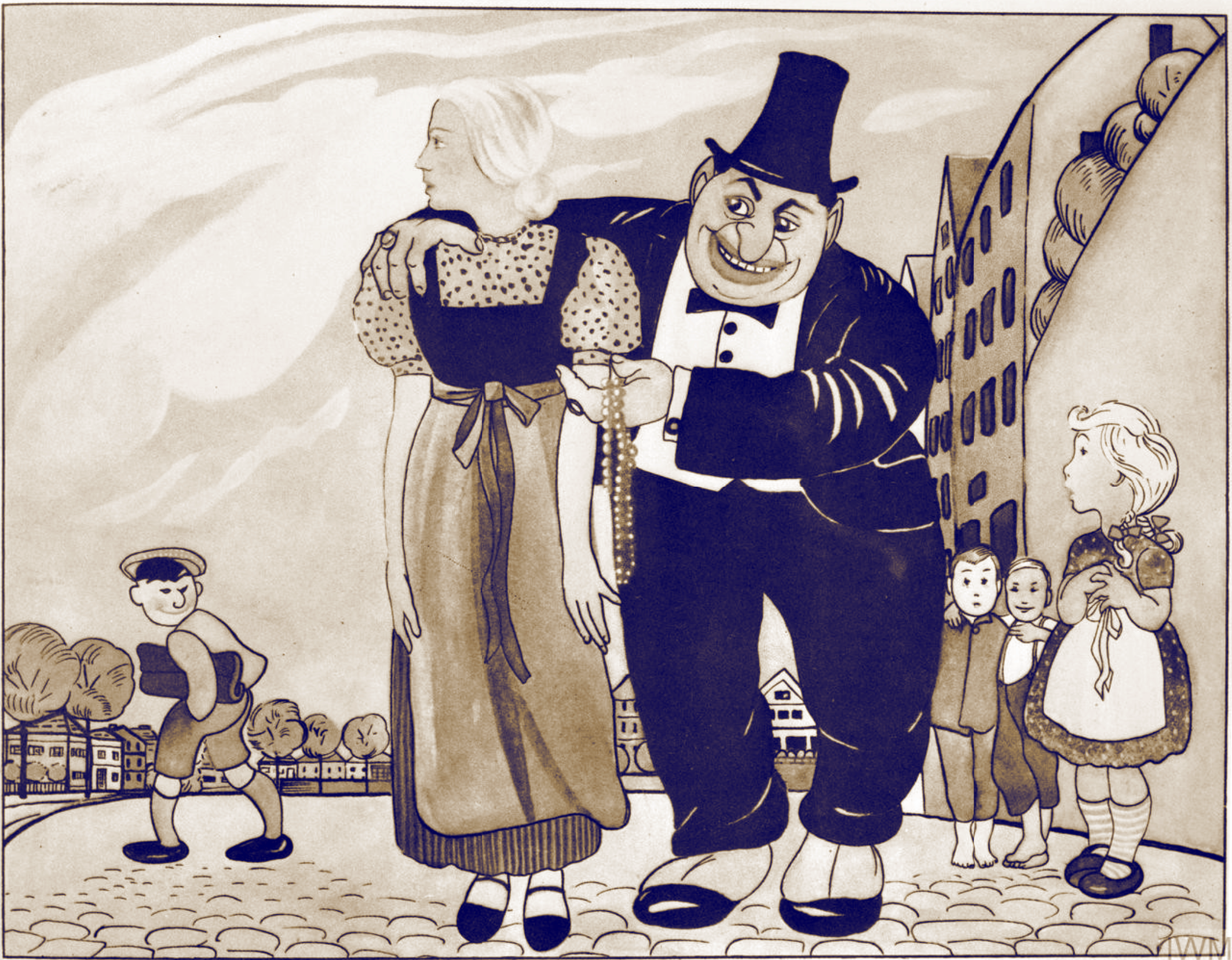
One does not have to go far to look for examples of how the foundational myth of a problem-group inadvertently ends up in mainstream narratives. We can look to our own collective lived experience to contextualise how perceptions about the social profile of a group morph from anecdotes to narratives. We can cite British Azad Kashmiris.
Azad Kashmiris are classified as a Pakistani ethnic group by a British officiating structure that locates minority groups within other minority groups through a legacy it helped shape. The consequence of this lingering regime is that an old colonial entente between native clients and foreign masters has outlived the British Imperial Project. Minorities forced within the officially classified group are invisible, becoming visible when they are scapegoated by the custodians of the dominant group, especially when mention is made of the group vicariously by the mainstream Media.
“It’s not us, it’s this other group called so and so…” They retort.
Azad Kashmir is not Pakistan, this is why Azad Kashmiris are not bonafide Pakistanis. Azad Kashmir is part of the divided State of Jammu & Kashmir popularly abbreviated to Kashmir. Pakistan’s Kashmir region is an occupied territory that was invaded by Pakistan’s Army in 1947 contrary to the legal norms that created India and Pakistan.
Saying this to Pakistanis is like creating an ulcer deep within their stomaches. They throw up their entire entrails. Visceral emotions borne of the inclination ‘my tribe, right or wrong’ doesn’t make the facts any less true. For instance, Pakistanis didn’t create Pakistan. Britain created Pakistan. The country was never created through the ashes of a group consciousness borne of shared misery, turmoil and resistance, which is how India and Bangladesh emerged. Pakistan was the product of political manoeuvring of North Indian Muslims operating from within a colonial intellectual tradition. Culturally speaking, ‘they were more English than the English’, this is how the colonialists described them.
The clever politicking backfired. Or at least according to Pakistani historians no longer welcome in Pakistan. For Britain, there were other strategic benefits of creating Pakistan, one of which was to contain the Soviet Union in what would become the pliable parts of decolonised British India. At the time, the empty threat of creating a ‘Muslim’ Pakistan to beat concessions out of a multi-ethnic and multi-religious Indian Congress coincided with some powerful interests. The laws of unintended consequences can do that, and Pakistan’s blunders and shortsightedness are not just the product of visionless leaders but 3rd party intrigues.
The leaders of the Indian Congress, at the time, were going in and out of colonial jails. The leaders of the Muslim League were being courted and played. Jinnah, the reluctant founder of Pakistan, lived a relatively privileged life with assets in Bombay. He used to drink whiskey, eat pork and order his double-breasted suits from Saville Row, London, an incongruous lifestyle with the political claims he made about Muslims being distinct and separate from Hindus.
In effect Pakistan was the thing that destroyed the unity of an expansive India that the British created a century earlier. These are inconvenient facts that get sidelined by those policing group identities as if they’re universal truths that never change.
When Azad Kashmiris came to the UK after the creation of Pakistan, and by that term I mean a dispossessed section of Jammu & Kashmir society, they had already been leaving Kashmir decades earlier. Before the momentous events of partition, they were identified as Kashmiris. This is just the nature of territorially ascriptive identities. Afterwards, they were identified as Pakistanis. This imposition of a false identity label followed the logic of partition, Pakistan existed for Muslims and Secular India existed for everyone else. Kashmir was a separate Princely State situated in the Western Himalaya, and its fate was to be decided by the Ruler, who wanted to remain independent. He was a Hindu and his subjects were mostly Muslim.
Kashmir was thus subjected to a military dispute caused by 3rd parties. In other words, the people doing the invading, fighting and killing at the time of partition were not from Kashmir State. They came from the direction of the Dominions of India and Pakistan, having been influenced by colonial precepts of the outgoing British, whom they love flogging when they behave no differently.
There’s a reason why India and Pakistan’s elite speak English. The laws of the two countries are based on the English common law system. English is the medium of higher education, commerce and the political culture. Indian English literature forms an important genre of English literature, which is something that should be celebrated, but this can come at a price. For instance, take what constitutes ‘entertainment’ in the two countries, Pakistan’s Lollywood is an imitation of India’s Bollywood which is an imitation of America’s Hollywood. The cultural cues move in a particular direction. From the bosoms of identity fictions, those telling us about our distinctive cultures and history accrue their entire human capital from the Anglosphere, Britain and North America. There is nothing culturally authentic about India and Pakistan especially in the areas where power resides.
This upsets the aspirants of both countries when you point out to them that their national cultures are imitative. Ordinary Indians and Pakistanis forced on the fringes of their societies with cultures borne of a particular lived experience remain alienated from the elites lecturing them about their primordial group identities and history.
The Pakistani identity is thus alien to the lived experience of Azad Kashmiris. In the UK, it is an imposition through the benign dictates of an officiating structure that fails to recognise the existence of disenfranchised minorities within minorities. This would be akin to telling Kurds from Syria and Iraq that they must return themselves on forms as Syrians and Iraqis. Even if they were the majority of British Syrians and Iraqis, a Syrian and Iraqi identity would be prioritised!
“Now tick the Syrian and Iraqi boxes for ethnic minority monitoring purposes, we want to empower and unite you through good old diversity.”
These official norms have been catastrophic for British Azad Kashmiris in terms of interacting with the British State and developing a sense of who they are within the context of their lived experiences, borne of deprivation, alienation and 3rd party political intrigues. We can think of this proposition through the observations of African American intellectuals dissecting affirmative action policies intended to remedy past injustices.
Observers tell us that Hispanics and other minorities have benefitted from affirmative action quotas reserved for the dispossessed African Americans. Indian immigrants, for instance, from privileged backgrounds have managed to enter America’s best universities and professions on the back of equality of outcome policies designed to empower the traditionally disenfranchised. When we try to make sense of the African American lived experience (a painful experience of forced dislocation and slavery) especially when the actual beneficiaries of American largess seek proximity to the American mainstream, it becomes perverse that wealthy immigrants can avail themselves of opportunities intended for those forced onto the fringes of their own society.
What do I mean by this?
It is the case that Indian-Americans of a particular immigrant experience (foreign students entering the American labour market), end up living in affluent suburbs, feeling removed from the blacks through which they were given the initial leg up. One merely needs to look at social media conversations to understand how some children of middle-class Indians and Pakistanis in North America describe the ‘ghetto’ to appreciate what I’m saying.
If we can accept this point, it shouldn’t be hard to understand the Azad Kashmiri experience within its proper context of human suffering, political occupation and economic exploitation. The lived experience of Azad Kashmiris is a completely different lived experience to Pakistanis, oddly something that Pakistanis love pointing out in the UK.
The analogies above if understood properly would put into context a profound grievance that has yet to be articulated politically. The two communities should be disaggregated at the official level. This isn’t about pitying Azad Kashmiris against Pakistanis, (Pakistan is exploiting Azad Kashmir according to numerous writers) but about liberating a disenfranchised community from the clutches of powerful interests self-perpetuating at the expense of ordinary people.
Decoupling from a Pakistani identity will allow a new generation of British Azad Kashmiris to live meaningfully according to values and norms that British society takes for granted. Focusing on their own problems, Azad Kashmiris will be able to integrate fully within the society it was raised in, accruing wellbeing, purpose and human capital. In counteracting this point, I’m sure my Pakistani adversaries will conjure up the usual platitudes and demons; Islam, Ummah, colonialism, racism and ‘white privilege’, the apparent bond that glued millions of Muslims together in East and West Pakistan in 1947, as it did on the eve of the Bengali genocide in 1971.
Pakistanis have grown accustomed to demanding protections and concessions from the British State because of their protected ethnic minority status courtesy of the Race Relations Act, but they don’t want their disenfranchised minorities to break away to better serve their communities. Just think of Ahmedis, Shia, the Pashtun, the Baluch and Christian-Pakistanis, all minority groups persecuted in Pakistan. Outside Pakistan, these groups are being told that they are one community.
If my readers have a problem with what I’m saying, I direct them to the Country of Origin briefings that Homeoffice caseworkers rely on when determining the applications of asylum seekers from Pakistan. Members of minorities are persecuted on account of their group identities, this much we know because the UK government tells us so. Azad Kashmiris are a tiny community in Pakistan, some 4.5 million in total. They are a stigmatised and persecuted group especially when vocally intersecting into the affairs of Pakistan because of its despotism against them. If they support Pakistan, they’re still treated with impunity, but if they pursue an independence cause, they are treated with contempt. These are facts and not pie in the sky theories. Although two thirds of the British Pakistani population, Azad Kashmiris exist on the fringe of Pakistan’s power structure, one of the most corrupt places on earth according to human rights organisations like Amnesty and HRW.
The contrast between the UK and Pakistan is poetic; Azad Kashmiris are free to live dignified lives in the UK, but in Pakistan they are treated like second class citizens. To add insult to injury, British writers turn to mainstream Pakistanis to understand who Azad Kashmiris are, empowering the former to become gatekeepers of the latter when there is no genuine fraternity (reciprocation) between the two communities. The relationship has always been one-sided to the advantage of Pakistanis keen to monopolise on the idea that they possess sufficient human capital to become the representatives of British Pakistani interests.
This ethnic tokenism only benefits Pakistanis.
The observations Pakistanis offer when the British Media shines its torch on ‘problem Pakistanis’ (grooming gangs, the 7/7 suicide bombings, forced marriages, socio-economic problems, etc) result in the scapegoating of Azad Kashmiris conveniently dubbed ‘Mirpuris’ from rural Kashmir. Paradoxically, the HDI of Azad Kashmir is higher than Pakistan’s and is entirely linked to remittences, which should be profound food for introspection.
So, what of the negative descriptions? They can be accessed from the extant social sciences’ literature not discounting troubling journalistic accounts. The way Azad Kashmiris are described is negative. It’s become embedded in the literature, and I don’t think the writers are aware of their covert prejudices. Alternatively, my readers can google the words ‘Mirpur’ and ‘Mirpuris’ to confront the unofficial descriptions. The narrative is out there if only dispassionate British officials and academics looked at how the idea of a Mirpuri identity is being constructed by British Pakistanis.
There is a huge body of scientific knowledge that shows how fractures emerge within a group when in fact the members are separate peoples with different histories and lived experiences. Locating these groups outside the old constructed borders doesn’t necessarily dampen the older grievances especially when the groups are forced together in newer social and political settings. Structural inequalities are at the base of emerging group consciousness, not because one ‘group’ feels inherently superior to another – ‘the bell curve’ version of some theorists, but because its members are reacting to unjust social and political norms.
Groups that are tolerated and celebrated today, not so long ago, were being flogged for being socially backwards, culturally regressive, racially and religiously flawed. The Irish (imagined as a national group), Jamaicans (imagined as a racial group), Jews (imagined as a religious group) have all been demonised. The constructed social profiles in question were conflated with inaccurate notions around race (genetics), ethnicity and class. Jamaicans are not actually a race. The Irish are not a national group. Jews cannot be reduced to a religion. We are speaking about millions of ordinary people with different temperaments, lifestyles, hopes, likes and aspirations.
Powerless group identities are always essentialised negatively. Members of powerful groups are presented positively, not as a group but as individuals. There is a kind of group-blindness to their actions, the group is never blamed for the criminal infractions of individuals.
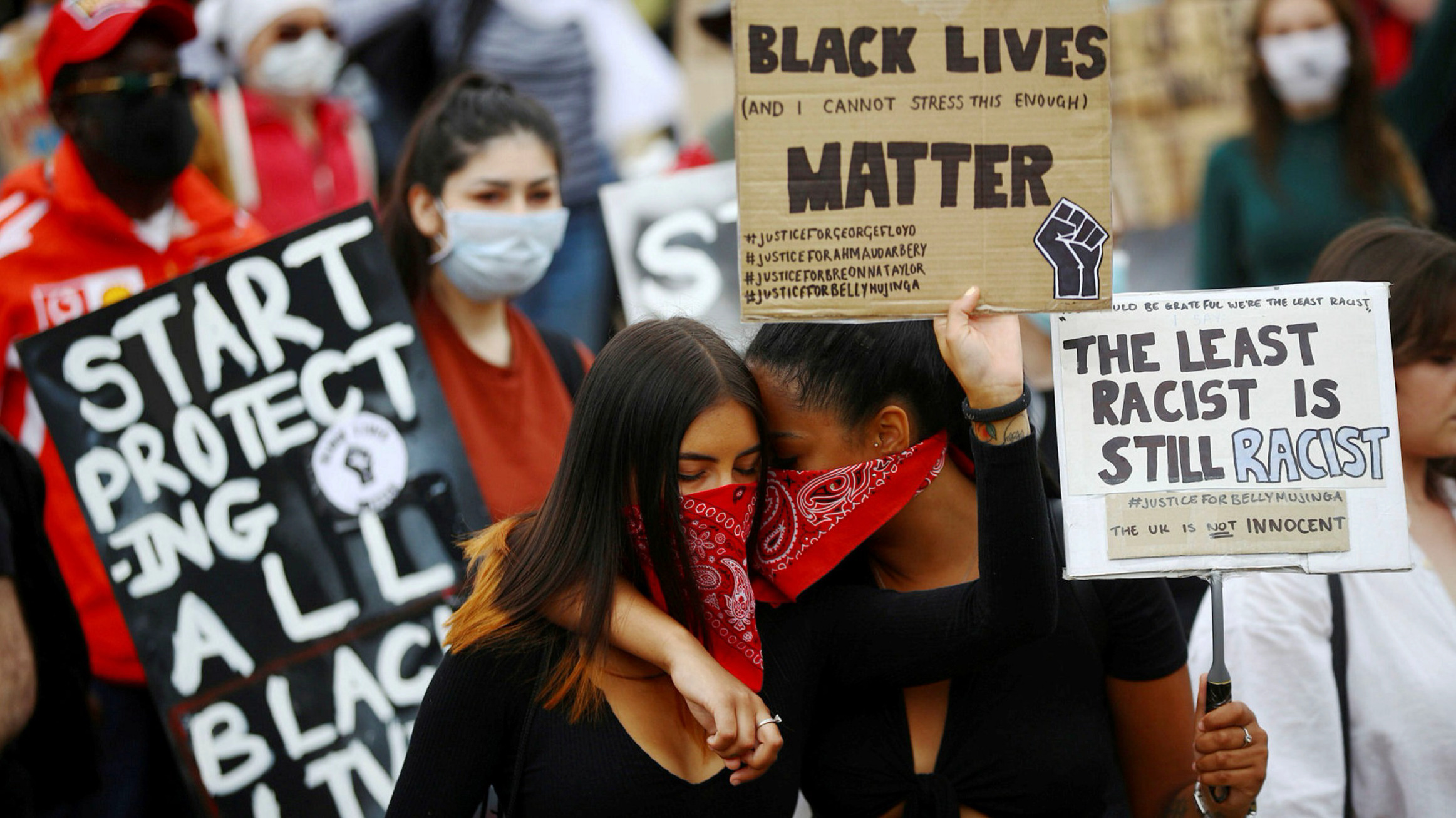
Not a lot has changed. The way things are going I don’t think we’re ever going to be free of stereotypical prejudice around designated groups, so long as we have native informants expertly navigating our social terrains to get ahead in life on the basis of the things we should all despise. They frequently dish the dirt ‘on the bad apples’ amongst ‘them’ even though they’re at pains to remove themselves from the group they represent.
Unsuspecting journalists who pride themselves on being objective, exploring the social landscape of ethnic minorities with subjective ideas constantly fall for the recycled anecdotes. Because of how they view people through their own subtle prejudices; prejudice is pre-judgement, that’s where the word comes from, they end up giving a wider platform to the anecdotes.
As quickly as the ink dries, the anecdotes become mainstream narrative. In the rear view mirror flows an endless line of native informants eager to applaud the new experts, a celebratory cycle that morphs into an impenetrable information bubble. In effect, the narrators become inoculated from genuine critiques by aggrieved members of the actual minorities within the minorities, who have skin in the game.
Valuable rejoinders are casually ignored leading to resentment and suspicion that Britain’s print and media culture is biased in favour of the old groups despite Britons being at the forefront of social change in the midst of its own society. Today’s middle class were yesterday’s working class. Yesterday’s working class were generations earlier, serfs. Before the late 1800s, the majority of people in Britain were poor, not in the relative sense of poverty, but in the absolute sense, they were living on less than a dollar a day, and life was excruciatingly hard for both men and women. The experience of Empire was not the experience of the ordinary Britons, even as the former opened up new opportunities for the latter, and channelled immense wealth into the mother country. But this wealth was restricted to the established networks. Poverty was rampant across the country.
With the advent of a progressive and liberal social movement, things started to change. Life for women improved because they entered the workforce commensurate with technological advancements in birth control and sanitary hygiene, which impacted the lives of countless men and children. There was more disposal income and the consumption of wealth. Thus, new opportunities arose and the world seemed less cruel thanks to all the people fighting for equality. Technology and social reform went together.
If we can accept that lives have changed immeasurably for Britons because of changing social and political norms, it shouldn’t be a leap to disaggregate ethnic groups from their illusory identity group bonds, mindful of a shared human story of suffering to rebalance the older more unequal relationships in favour of a genuine British egalitarianism.
After all, wouldn’t this be a befitting consequence of British values?
A case study in subtle prejudice; al-Britannia, My Country by James Fergusson
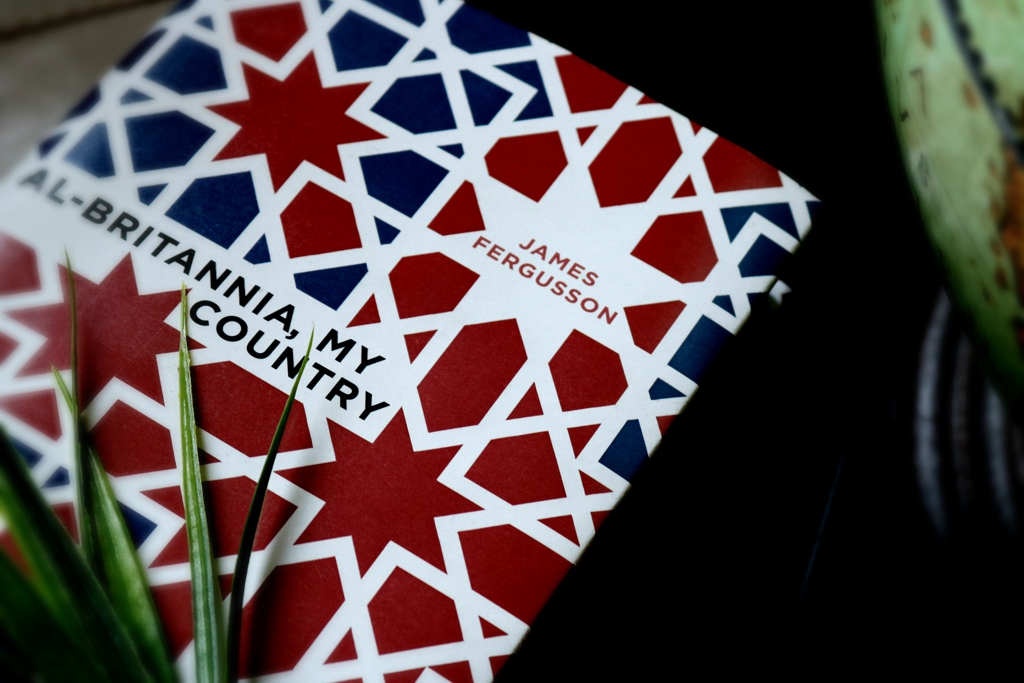
An example of the unjust dynamics discussed above would be to read an anecdotal sort of story written by James Fergusson entitled Al-Britannia, My Country. Despite being sympathetic to the Muslim lived experience in the UK, the writer ends up parroting anecdotes that have long been a problem amongst Pakistanis looking down their noses at other Pakistanis in social class terms. He presents Islam as an essential component in the British Pakistani identity. British Pakistanis comprise one third of all British Muslims. Fergusson doesn’t contextualise the actual lived experiences of Muslims, but constructs a false image of British-Pakistanis through the social class prejudices of the gatekeepers.
The book is an exoneration of good Muslims, and when you have good Muslims you’re left with bad Muslims. Good and bad is being adjudged in social terms, a new kind of post-modernist morality that reduces groups to how well they function in a society sociologically speaking, ignoring the history of unjust power relations.
There is an irony however. Pakistanis problematising the groups within their ranks originate from a country languishing at the bottom of human development indices. For fear of stating the obvious, countries are people, and Pakistanis are not leading the nations of the world when it comes to enlightenment. The Azad Kashmiris that Pakistanis complain about through the pejorative use of the selective term “Mirpuris” have always existed on the fringe of Pakistan’s neopatrimonial order. Emancipation for Mirpuris would mean exiting the unjust neopatrimonial order called Pakistan.
If the irony wasn’t that bad, Mirpuris, (correctly speaking, Azad Kashmiris), make up a tiny percentage of Pakistanis. There are 220 million Pakistanis. There are only 4.5 million Azad Kashmiris. Of Britain’s 1.2 million Pakistanis, two thirds come from Azad Kashmir. So, why is a majority community with a territorial ascription of its own being forced to identify through the identity label of a smaller group?
This is counter-intuitive not least because Azad Kashmiris are constantly being identified as Mirpuris, Mirpur is the name of an area within the divided Jammu & Kashmir State, which gives credence to the logic I deploy here. The Azad Kashmir lived experience has been deliberately expunged from actual representations, and it just proves how unjust and unfair British media representations of minorities within minorities can become.
Pakistan cannot function without the assistance of international loans, grants and bailouts. Only 1 percent of the population pays taxes, and this includes around 50 percent of the lawmakers. Its Military Complex owns the State if one turns to the writings of academics like Aysha Siddiqa. That’s the widespread consensus of analysts across the world. Some think Pakistan will violently implode like it did in 1971 when East Pakistan became Bangladesh after having fought a bloody war of liberation.
Yet abroad, Pakistanis think because they come from cities like Lahore, Karachi or Islamabad, and not villages (the urban vs rural divide is an underlying theme in Fergusson’s book), they automatically occupy a higher rung on a social class consciousness that predestines them to join the more respectable British mainstream – the middle-class.
They then actively differentiate themselves from the lessor socioeconomic beings, a “mass” of undefined sum-parts going about its business casually unaware of how Pakistani interminority group exceptionalism works. Conveniently, they claim a kind of false fraternity with the group they problematise, exploiting its numerical presence (representation) whilst actively separating from its uneducated working class members to celebrate their own social virtues.
Everything Fergusson says about “Mirpuris” (the Azad Kashmiris) is more or less negative. I don’t think he even realised he was doing this but this just shows how flawed anecdotes can become narrative. I’m mindful of the entries under “Mirpuris”, page 380. One example will suffice for the purpose of this article, I cite it here to capture poignantly the split-personalities involved in the demagoguery of groups and the inconsistencies in the ensuing narrative.
At page 198, when describing a Pakistani comedian, Shazia Mirza (a good Pakistani from the city), he quotes verbatim the provocative remark – “I know Pakistanis who think of Mirpuris as self-ghettoising, cousin shagging Neanderthals”. If this isn’t an offensive statement, I think the people dismissed because of political correctness should be reinstated to their jobs.
If someone said, “I know Scots who think of Glaswegians as self-ghettoising, cousin shagging Neanderthals”, that would be the end of a person’s social respectability. Political correctness would demand that the alleged bigot forfeit his BBC or ITV engagements immediately! Apparently, we can’t have such people remunerated through tax payer largess coveting powerful public platforms. It sends out the wrong signals, we’re told.
But, it’s okay to insult Slovakian Roma through clever sociological descriptions,”structural discrimination has predisposed them to begging and pick pocketing, it’s not their fault!” Now try historicising such antics against British Jews, who were victims of centuries of European pogroms and the Holocaust. The old descriptions of the ‘big-nosed’ ‘stingy Jew’ with ‘shabby clothing’, (note, how “Chavs” are described) still exist in the extant literature. The word ghetto is borne of the Jewish lived experience in Europe. It may carry negative connotations when applied to deprived inner-cities with disproportionate levels of criminality, but it captures something very rotten about human suffering and disenfranchised groups. It’s no secret that dispossession leads to infractions of the criminal code.
Aside from the selective civility for Jews, billions of people have been married to their cousins, and they’re not all Muslims. They include members of the British Royal Family and historical personalities like Darwin and Einstein, who were married to their first cousins respectively. Books exist on the subject of elites marrying within their own networks to ensure the continuity of their economic power and social status. And yet there’s no corresponding negative imagery for such people. Why would it not be okay for someone to describe the great founder of evolutionary theory of natural selection, Mr Charles Darwin “as a cousin shagging biologist”?
Perhaps, it’s about genuine concerns for the welfare of children born to cousin-shagging parents? The more closely related your parents, the greater the likelihood of inheriting recessive diseases. So, what about the prevalence of recessive or hereditary diseases amongst European Jews because of how “inbred” they are to borrow another offensive term to describe an infraction of the new Middle-Class code?
I’ve spoken to a chap who personally knows Shazia, apparently she’s not from Rawalpindi or Lahore, which kind of makes Fergusson’s comparison even more suspect. He’s adamant that she would never use this kind of degrading language. He tells me that Fergusson came to Shazia with a rehearsed script. He may have put these words in her mouth. I don’t know. But, I can cite Fergusson’s actual words when describing Shazia’s physical appearance contrasting her to the rest of the “Asians” of the “North”,
“…with her long, languorous face and heavily lidded eyes, she seemed a sophisticated citified kind of Pakistani, quite different to the working-class Asians I had been spending time with in the ex-mill towns of the north. She had been brought up in the “very white” Birmingham suburb of Harborne (note how the words “middle class”, “white” and “north” are being used?), by parents who were very “definitely not rural Mirpuris” but from Lahore or Rawalpindi.” Page 199.
Note, the words “definitely not rural Mirpuris”?

I don’t think Fergusson has been to Rawalpindi or Lahore. I don’t think he’s been to Harborne either. He knows nothing about how Rawalpindi folk are disparaged by the “citified” folk of Islamabad – the term “Pindu” (villager) usually comes up in their prejudicial descriptions of the lessor citified folk of Pindi. Social class for a lot of Pakistanis is a wonky ladder. It’s not an equaliser, but a badge of immense inequality.
Perspective is however needed. A decade ago or so, someone built a couple of high-rises in Islamabad, called the Centaurus. The complex houses a hotel, offices, shops and apartments. It’s became a tourist attraction, a landmark now associated with Islamabad. To keep the Pindoos (villagers) of ‘Pindi’ out (lessor-citified people), an entrance fee was charged. Imagine, in the heart of sophisticated Pakistan, shoppers need to pay an entrance fee to get into a rather ordinary looking building relative to international standards, which became proof for Islamabad folk that they were on some global map.
Let me give my readers some more perspective. Modern and upwardly mobile Pakistanis dress up to grace fast-food chains like MacDonalds and KFC. Buying a Big Mac is not merely a privilege in Pakistan, it’s proof that you’re of “modern” stock, evidence that you’re a somebody, and not an “ancient” nobody, the likes of parents and grandparents. I’m not making this crap up. There’s huge disconnect and hatred between social and ethnic groups in Pakistan, the rich are constantly looking down their noses at the poor and their own forebears. The self-affirming anecdotes they spread became dangerous narratives.
I’m trying to explain the rituals of wanting to belong to an imaginary ‘identity’ all the while a person begins hating everything about his or her authentic past, because this is the way of getting social respectability from the dominant groups. Islamabad isn’t exactly a middle-class utopia of liberal values though. It’s a horrible place for minorities and women.
Not so long ago, the Pakistan Army hid Bin Laden in Abbottobad, a garrison town. The Generals took money from America to find him to appreciate the level of duplicity in Pakistan’s corridors of power. Having trained the Taliban to sow discord in Afghanistan through Saudi and American largess when they were pliable clients, they then sought to liberate the Red Mosque from the unruly extremists they nurtured. Chickens had come home to roost.
The Red Mosque Complex was located in the heart of Islamabad. From its pulpits, an entire generation was radicalised by extremist preachers. Crucially, the pillars of extremism were not bussed in from the villages surrounding Rawalpindi, they came from the heart of the “primordial city”, from Karachi and Lahore. Upwardly mobile Pakistanis are encouraged to adopt Urdu which should not be conflated with the lived experience of ethnic Urdu speakers in Pakistan – another minority that is having a terrible time in Pakistan. Urdu has become the symbol of the citified Pakistani, who hates everything about Pakistan’s rural past, expunging the actual memories of forebears, generations and generations, because they are deemed lessor humans.
Let me explain something that’s missing from popular narratives about dysfunctional Muslims. Islamist fundamentalism is a product of the city and not the village, it’s a product of modernity. Islamism has no relationship whatsoever with the actual lived experiences of rural folk, where Islam is devotion to God and a genuine commitment to good behaviour. Identity politics makes little sense to rural Muslims. Their universe of meaning is rooted in Sufism and co-existence, of feeding neighbours, taking care of the elderly, giving refuge to strangers and travellers, of being kind, gracious and polite. They don’t understand the rhetoric of “this group is your enemy and that group is your enemy too because Islam says so!” The leap from Sufism to Liberalism would be smaller than the leap from Urban Islamism to British values. Urban Islamism is currently trying to expunge Sufism from Pakistan’s rural areas; its cadre are intolerant and violent. They are control freaks.
Fergusson doesn’t know what he is talking about when he starts to offer anecdotes about Pakistanis and Mirpuris. His ignorance of these one-sided rivalries is breathtaking. Aside from objectifying Shazia according to arbitrary and idiosyncratic beauty standards, heavily lidded eyes makes a women look sophisticated apparently, he doesn’t seem to care about how he would make “working class Asians” from “the north” feel as if there is something wrong with them, which there isn’t.
Because he’s hung out with native informants telling him what he wants to hear, he thinks he has the right to express such prejudice. Fergusson’s book is an attempt to show that British-Muslims are diverse, so he pities one group of conservative retrogrades against another batch of progressive liberals, which they’re not. Liberalism is reduced to an illusory identity connected with progressive Muslims (“the moderates”), who think by claiming a particular social status they will achieve social respectability. Their version of Islam is identity politics of an urban and technocratic bent.
Fergusson tells his white readers, “hey readers don’t hate on the respectable people like us, just hate on the “working-class” Muslims from Bradford, who look and behave a certain way, I will construct the image for you. There’s a whole sociology behind their behaviour even as I feed into grotesque stereotypes to make the anecdotal descriptions stick!”
How he contrasts Shazia to the “working-class” “Asians” he meets in the “old ex-mill towns” of the “north” is revealing of profound stereotypical bias. He packages subtle prejudice as insights to an unsuspecting audience. There is a rippling effect to these stereotypes. Just look at the Guardian’s review of Fergusson’s book, and note the accompanying picture below to appreciate the subtle prejudice in the sub-heading?
What exactly is the messaging?
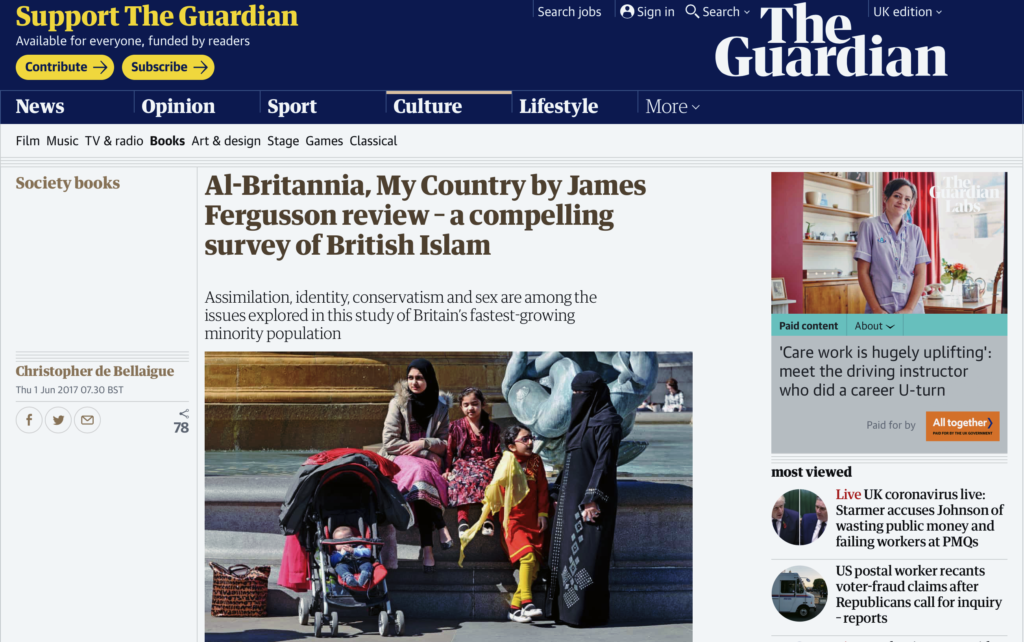
When describing“rural Mirpuris”, the antithesis of citified-Pakistanis (all British-Pakistanis from rural places are lumped together, this is how the village-citified identity is imagined wrongly), readers are left with bewildering contradictions.
Following on from the same paragraph I quoted, he says of Shazia’s parents, “Her father used to drive her to school every day, taking her right to the school gates to avoid any possibility of socialising beyond them”. Of Shazia’s mother, he says, “She used to enjoy swimming but her mother stopped her when she was 13 because the costumes were unseemly”. And let’s not forget a running theme for a lot of these commentators on Islam, the sexual repression of Muslim women, he says, ”she hung posters of Tom Selleck and Don Johnson on her bedroom wall but there was no chance of even talking to a real boy, let alone kissing one.”
Fergusson then quotes Shazia, if he didn’t put these words in her mouth, “the Muslim girls she taught, she recalled never talked about Islam or foreign policy or anything. All they ever talked about was boys”.
I thought Shazia was brought up in “very white”, “middle-class” Harborne by parents who were “definitely not rural Mirpuris”, but “from Lahore or Rawalpindi”?
So, how are they different to the working-class Mirpuris bought up in non-white working class areas, who deny their daughters freedoms and everything else taken for granted by an enlightened middle class, whose culture and white surroundings predispose brown and black aspirants to liberal norms?
Fergusson’s book is rooted in anecdotes and not facts, that’s why the logic of his claims produce contradictions. It’s a repetition of stereotypes. It’s redemptive of a particular kind of identity politics. The book tells us nothing about the actual realities of British Pakistanis and the struggles of ordinary people. He merely speaks to one coterie of Muslims, accessible to him because of his own prejudices, relying on them to describe all the others. He claims to be a neutral bystander, when he clearly isn’t.
I still recall one article on 7/7. The Guardian writer spoke of Mirpur’s culture that spurred suicide bombers. She referred to Mirpuris as the “Orphans of Islam”. These are totally bogus propositions and utterly offensive, reading these words today will elicit laughter, but just imagine at the time, how such insights were being received?
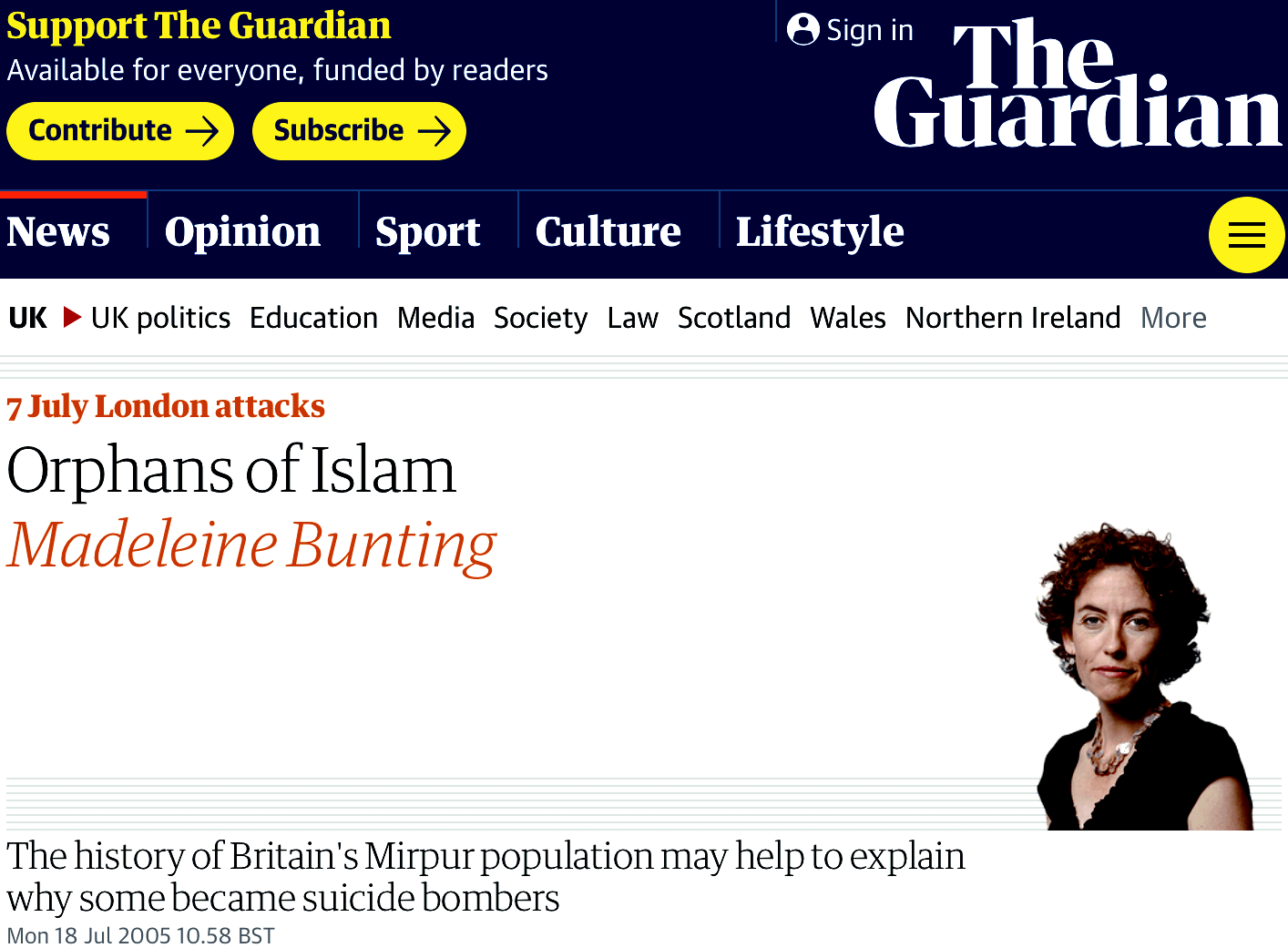
I’m no longer shocked, (frustrated, yes), because I know the group identities of the native informants. The problem is not the BBC or the Guardian but the local “experts” relied on. What the Guardian writer didn’t know at the time was 3 of the 7/7 British-Pakistani bombers, (the parents at least), originated from Punjab Province, Pakistan and not Mirpur. In other words, it was just assumed that they must be Mirpuris, Bunting used the words “in all likelihood” because the suicide bombers came from Leeds, a “northern” backwater of the UK.
An entire group was slandered on the basis of mistaken identities. 15 years later, this factually incorrect piece of journalism has never been corrected or removed from the Guardian website, which shows how anecdotes turn into narratives. The nature of subtle prejudice when it intersects with marginalised communities and the mainstream deceives and never enlightens. Worse, no one from the British Pakistani community, or those with the requisite amounts of human capital felt the urge to correct the flawed account.
Why?
Because British Pakistanis are not Azad Kashmiris. Azad Kashmiris become Pakistanis when ethnic tokenism requires a befitting representative for the anecdotes. The disinformation produced feeds into the subtle prejudice and confirmation bias. The same progressive Muslims were queuing up to attack Trump because Trump is a bigot. But, they’re not bigots when they demean members of their own communties, the “Chavs” of Pakistan, to borrow a pejorative term from cross-cultural references.
Eventually, the dispossessed masses become so alienated that the values of classical liberalism are unjustly flogged by virtue of association, a step backwards. Ordinary folk then resort to counter-culture narratives in defiance of the personalities promoting liberal thought.
For Azad Kashmiris, aside from ditching the Pakistani identity for self-preservation, they need to be careful when documentary makers turn up at their doorstep wanting to do documentaries on their communities, or writers humbly requesting their hospitality to produce literature to smear them as social misfits. Demagoguery is one of the oldest vices in history, and even good people occasionally partake in it.
Some writers have preconceived ideas about the social worth of group identities, and they are looking for confirmation bias. If ingroup members don’t fit the stereotypes, they won’t be interested in what they have to say because of their pre-judgements. This is how they sell their “ideas” to their tribe through confirmation bias. They lack the intellectual investiture of people of conscience, whose caveats would be a profound warning to not create elaborate stories that fit the existing stereotypes.
Fortunately for us in the UK, conviction journalists exist in large numbers, and they work for the BBC and the Guardian. Some commentators do reinforce the old problems looking for the old villains, imagining the good guys to be just like them. They’ll make money, get the claps and receive the awards; black, brown and white bodies will embrace each other symbiotically. Then, they’ll return triumphantly to the progressive bubbles they come from living their separate but parallel lives. In the meantime, they’ve just added another layer of shite to the problems of minorities within minorities.
When challenged, they get offended, outraged, incensed that someone from Birmingham, or Bradford dare talk back, “we’re not orphans of Islam. You’ve been demonising “Muslims”, “Rednecks”, “Chavs”, “the working class” for decades. We’re just the latest incarnation. We’re not cousin shagging Neanderthals. The only grunts I hear, come from you!”
And it’s then they turn vindictive assassinating the characters of the “hate-mongers” because they had the nerve to speak truth to power, whilst being completely powerless with no backers.
“It’s because they want attention, no one is listening to them!” They convince themselves.
Ah, but people are listening in droves. I think Trump proved that. As for my “working class” “inbred cousins”,”the primordial villagers from Azad Kashmir”, they can no longer be complacent. If on the other hand, they still think there’s no problem with the Pakistani gatekeepers in the UK, (I’m not speaking about Pakistanis in Pakistan or the North American experience, they seem to be more fraternal), they too can wash their hands of the primordial villagers. They should continue flying Pakistani flags virtually from their social media profiles to prove their tribal identity. In time, they will realise why they were sorely misguided.
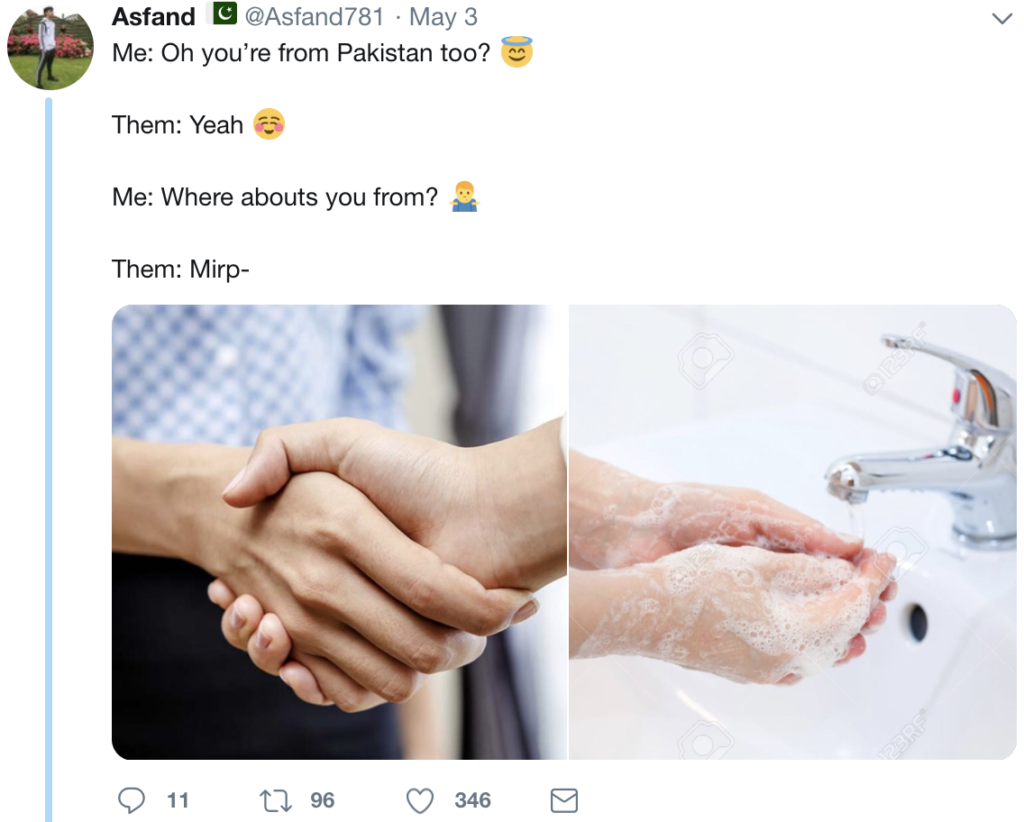



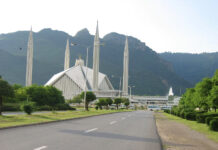




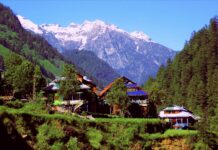





![Reclaiming AJK For Her People [Video Segment]](https://www.portmir.org.uk/wp-content/uploads/2021/03/districts-of-divided-JK-State-100x70.png)